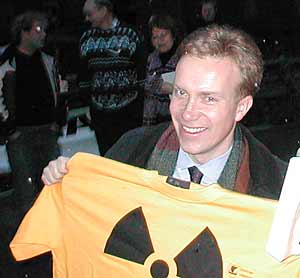Murmansk - The owner of the Sellafield plant is given permission to keep up controversial plutonium experiments at Halden
In the proposed government budget, the Norwegian government supports the 90 million Norwegian Crone grant to the nuclear reactor in Halden, Norway, to be dispersed over three years. Thus, the controversial experiments on mixed oxide (MOX) fuel will continue.
Next target: Norway
It is less than one month since eight elements of fresh MOX fuel arrived in Sellafield after having been transported by ship from Japan. A number of different coastal nations opposed the transport of this extremely dangerous uranium and plutonium blended fuel, and a fleet of small crafts even tried to stop the fuel delivery.
Norway may be the next country to receive MOX deliveries. Today, the Norwegian government confirmed positively the continuance of the experiments on MOX at the Halden reactor. Most likely, the owner of the Sellafield plant, British Nuclear Fuel Limited, or BNFL, will become one of Halden’s contractors. It is still uncertain just when the new MOX experiments in Halden will take place, but the nuclear fuel will in all likelihood be transported by ship to Gothenburg and then by road to Halden.
MOX is a type of nuclear fuel mainly being produced at the reprocessing plants in Sellafield, UK, and in La Hague, France. There have been massive protests against MOX fuel.
Safety deficiency
The former Norwegian Minister of Environment, Siri Bjerke, was concerned about the activities undertaken at Halden and ordered an evaluation of Norwegian nuclear experiments. The evaluation was performed by the Norwegian Institute of International Affairs (NUPI), and was concluded in February 2002.
NUPIs conclusion was clear: apart from contributing to increased discharges from Sellafield, the experiments are in conflict with a number of Norwegian environmental and proliferation considerations.
Many Norwegians therefore, expected the new Minister of Environment, Børge Brende, to stop the MOX experiments at Halden. He never did, however. Rather, a stipulation has been included in the government budget stating that such experiments shall only intend to make the use of MOX safer. This stipulation is the same stipulation which was referred to last time the Halden project was granted government funding, in 1999. Whether the research activities in Halden influence the safety aspects of MOX fuel is in no way certain.
In its evaluation, NUPI clearly established the point that the distinction between increased safety and contributions to extend the lifetime of old nuclear reactors was marginal in the case of Halden. The one undoubtedly correct attribute, however, is that the research activities in Halden contribute to make MOX more competitive, and, by doing so, prepare for continued reprocessing at the Sellafield plant.
Secrets
Due to Norwegian government secrecy, information about both the arrivals date and the safety measures connected to the transport of MOX is not disclosed. Whereas the MOX transports to and from Sellafield are treated with a great deal of openness, both the number of transports in the coming three-year period, what roads the transports will follow and, finally, what security measures are planned are kept secret in Norway.
Both Bellona and Nature and Youth have protested loudly against the new MOX experiments.




